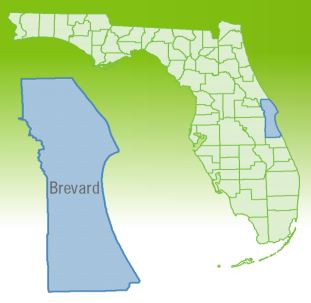29 Essential Tips
That Get Homes Sold Fast
(And For Top Dollar)
Selling your home in Brevard County Florida area is one of the most important steps in your life. You home has unique characteristics and they need to be highlighted. Here are 29 essential tips you must know...
For most people, selling their home means cashing in their biggest asset. In other words, it must be handled with great care if you hope to protect—and capitalize on—your investment. In today's market and with the Internet bring buyers from all locations this is critical.
It makes no difference what part of Brevard County you live or if you have, golf front, waterfront or acreage with fencing for horses or live in a subdivision in town you still need to have a plan to sell your home...
Tip No. 1:
Know why you're selling.
The reason you look closely at why you want to sell is that your motivations play an important role in the process.
Tip No. 2:
Once you know, keep it to yourself.
Your reasons will affect how you negotiate the sale of your home, but they shouldn't be given as ammunition to the person who wants to buy it.
Tip No. 3:
Do your homework before setting a price.
Settling on an offering price shouldn't be done lightly. A market analysis plus a trend report showing prices can be used to guide you in setting your price.
Tip No. 4:
Go home shopping yourself.
The best way to get to know your competition in Brevard County , identify features that are popular and learn what turns buyers off is to check out other open houses. Let's go look at the competition..
Tip No. 5:
Know when to get an appraisal.
Sometimes you can use a good appraisal to your benefit in marketing your home. In Brevard County some homes are so unique that an appraisal is needed.
Tip No. 6:
Your tax assessment means almost nothing.
Some people look to tax assessments to assign a value. The problem here is that assessments in Brevard County may not reflect the current market.
Tip No. 7:
Find a good Realtor®.
Nearly two-thirds of the people who sell their own home say they wouldn't do it themselves again, according to research by the National Association of Realtors®. An agent that knows Brevard County and your area can help get you the best market value.
Tip No. 8:
Give yourself room to negotiate.
Make sure you leave yourself enough room in which to bargain. Stay current with the market trends by receiving frequent market updates.
Tip No. 9:
Maximize your home's sales potential.
Each year, corporate North America spends billions of dollars on product and packaging design. The lesson here is that appearance is critical—and it would be foolish to ignore this when selling your home.
Tip No. 10:
Rely on other people's judgment as well as your own.
The key to effective marketing is knowing your product's good and bad points. In the case of your home, accentuating the good can mean a faster sale for more money; failing to deal with the bad can mean months on the market and a lower-than-desired sales price.
Tip No. 11:
Clean like you've never cleaned before.
Pick up, straighten, uncluttered, scrub, scour, dust...well, you get the idea.
Tip No. 12:
Fix everything no matter how insignificant it may appear.
The step that squeaks, the light switch that doesn't work, the hairline crack in the bathroom mirror—they might be minor annoyances to you, but they can also be deal-killers.
Tip No. 13:
Remove all traces of you from your home.
When you toured other people's homes, you may have felt some discomfort. This probably occurred because you saw, heard or otherwise sensed something that made you feel as if you were intruding into someone's life. Smaller than a basketball pack it away.
Tip No. 14:
The little touches can make a difference.
While personal items can detract, other small touches can help make your house a home to buyers.
Tip No. 15:
Don't let a smell be your downfall.
Odd smells kill deals quickly. All traces of food, pet and smoking odors must be eliminated.
Tip No. 16:
Disclose everything.
Smart sellers proactively go above and beyond the laws to disclose all known defects to their buyers—in writing.
Tip No. 17:
The more prospects, the better.
By maximizing your home's marketability, you'll increase your chances of attracting more than one prospective buyer. Your home should be on more than 40 website to have great exposure.
Tip No. 18:
Don't get emotional during negotiations.
The extent of most people's experience in the art of negotiation begins and ends at their local auto dealership. And few of us have pleasant memories of haggling with car salesmen.
Tip No. 19:
Know your buyer.
In the negotiation process, your objective is to control the pace and set the duration. And the better you know your buyer, the more easily you can maintain control. Know if your price home is in seller's market or buyer's market.
Tip No. 20:
Find out what the buyer can pay.
As soon as possible, try to find out the mortgage amount the buyer is qualified to carry and the size of his down payment. If he makes a low offer, question his Realtor® about his client's ability to really pay what your home is worth.
Tip No. 21:
Find out when the buyer would like to close.
When a buyer would “like” to close is often when they need to close. Try to be flexible with the close date.
Tip No. 22:
Don't sign a deal on your next home until you close the deal on this one.
If circumstances conspire to force you into closing on your new home while you're still making mortgage payments on the old one, you might end up turning yourself into a seller who is eager (or desperate) for the first deal that comes along.
Tip No. 23:
Don't move out before you sell.
Studies have shown that it is more difficult to sell a home that is vacant—it looks forelorn, forgotten, simply not appealing. If you have to move leave some furniture behind.
Tip No. 24:
Don't give yourself a deadline.
Forcing yourself to sell by a certain date adds unnecessary pressure and puts you at a serious disadvantage in negotiations.
Tip No. 25:
Don't take a low offer personally.
The first offer is invariably well below what you both know the buyer will end up paying for your property.
Tip No. 26:
A really low offer may mean the buyer's not qualified.
If you feel an offer is inadequate, now would be a good time to make sure the buyer has been qualified to carry a mortgage of the size this deal would require (if you haven't learned this already)..
Tip No. 27:
Don't take a lowball offer seriously.
An unacceptably low offer should not be taken personally or seriously.
Tip No. 28:
Make sure the contract is complete.
The best way to avoid problems is to make sure that all terms, costs and responsibilities are spelled out in the contract of sale.
Tip No. 29:
Don't deviate from the contract.
Resist the temptation to diverge from the contract. For example, if the buyer requests a move-in prior to closing, just say no. Now is not the time to take any chances of the deal falling through.
Hard Work Pays Off
If this all sounds like a lot of work, it is. But it's to be expected when you're selling anything of such great value. And you'll thank yourself for all the expense and hard work when the outcome works to your satisfaction.


